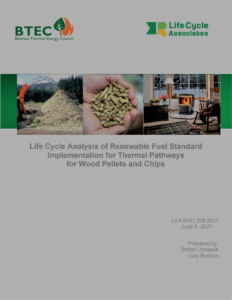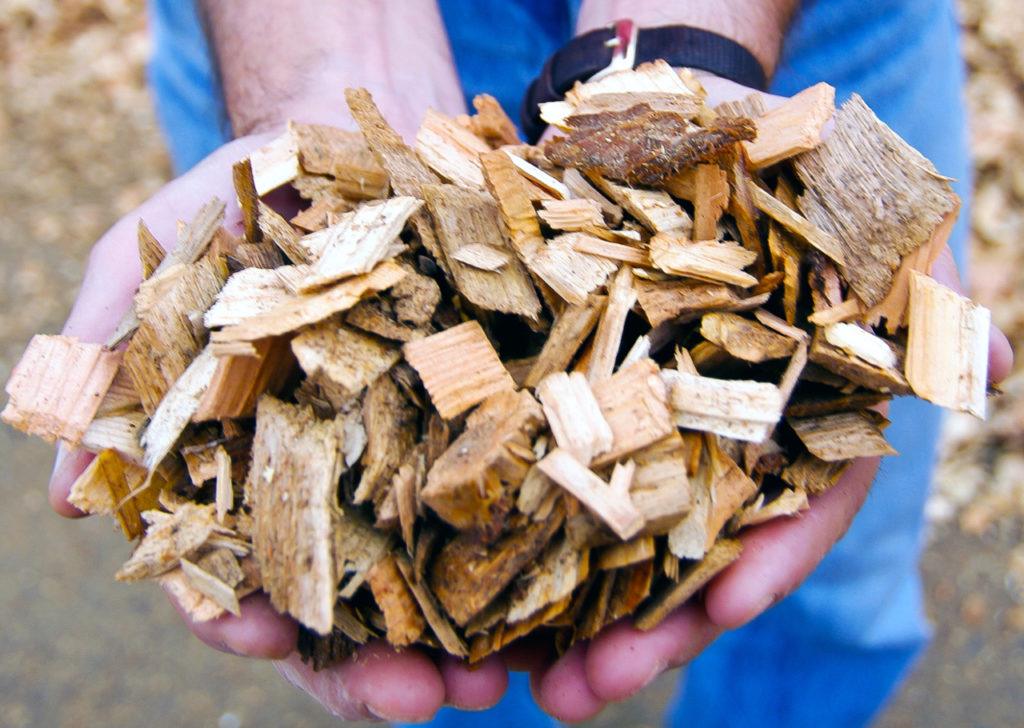
“It has long been known that using wood fuels for heat reduces greenhouse gas emissions by displacing the use of conventional fossil fuels, like heating oil and natural gas,” said Peter Thompson, BTEC Deputy Director. “This new study quantifies the GHG advantages of wood fuels for the record and highlights the avoided emissions from the resource’s alternative fates.”
“The use of fossil fuels for thermal energy (heating, cooling, industrial process) is an overlooked 1/3rd of our energy country’s energy use. Low value biomass residues are often treated as wastes with very poor carbon fates, require extremely little processing to become thermal energy and are shown to have very low Carbon Intensity scores. Opening the RFS up to some of the most efficient pathways to replace heating oil and other fossil fuels used for both heating and transportation would be a major win for rapidly and drastically reducing carbon emissions,” said Dan Wilson, Vice President of Wilson Engineering Services and former BTEC Chair.
“Maintaining markets for wood processing residues supports the effort of keeping forests as forests across the country. Use of these manufacturing residues for renewable energy is such a market. Their use for energy displaces fossil fuels and avoids alternate fates which have substantially greater climate impacts,” said Lew McCreery, Forest Products Technologist of the USDA Forest Service, Eastern Region State and Private Forestry.
“The benefits of avoiding agricultural burning or composting emissions are often overlooked in discussions about biomass energy,” said Stefan Unnasch of Life Cycle Associates and Technical Manager of the analysis project team.
Since wood pellets and wood chips meet the GHG reduction targets under the RFS, are often made from waste biomass sourced from forest product mills, forest residue, fire hazard reduction, and culling of insect-infested standing dead trees, and have a significantly lower CI compared to heating oil and natural gas, the Study recommends that EPA reevaluate the RFS and consider creating a pathway for thermal conversion of biomass to thermal energy.
If biomass-based thermal energy were included under the RFS2, it could generate a D3 RIN, valued in the Study at $1.50/RIN. For 1 MMBtu on an HHV-basis or 77,000 Btu on an LHV-basis, this would generate 12 RINs or $312 per ton of biomass (dry basis).
The Study is available here: https://biomassthermal.org/wp-content/uploads/2021/06/LCA_TTC-Wood-Pellets-Chips-GHG-FINAL.pdf
***
The Biomass Thermal Energy Council (BTEC) is an association of biomass fuel producers, appliance manufacturers and distributors, supply chain companies, and non-profit organizations that view biomass thermal energy as a renewable, responsible, clean, and energy-efficient pathway to meeting America’s thermal energy needs. BTEC engages in research, education, and public advocacy for the growing biomass thermal energy industry. Learn more online at https://biomassthermal.org.
Life Cycle Associates analyzes the energy and environmental impacts of fuels and energy systems. We work with clients around the world to further the reduction of harmful emissions and negative impacts on the environment and climate. www.lifecycleassociates.com
Project Steering Committee
The Biomass Thermal Energy Council and Life Cycle Associates extend their appreciation to the Steering Committee Members for their review and insights into biomass harvesting, transportation and processing operations, including field and plant equipment and associated fuel use.
- Lew McCreery, USDA Forest Service
- Dan Wilson and Steve Knobeloch, Wilson Engineering Associates
- Peter Thompson, Biomass Thermal Energy Council
- Stefan Unnasch, Life Cycle Associates
- Lucy Buchan, Life Cycle Associates
- Bill Strauss, Future Metrics
- Adam Sherman, Biomass Energy Resource Center
- Ken Adler and John Ackerly, Alliance for Green Heat
- Terrence Sauve, OMAFRA/EMB
- Timothy Volk, SUNY ESF
- Becky Phillips, Agricultural Utilization Research Institute
- Maura Adams, Northern Forest Center
- Rob Davis, Forest Energy Corporation
- Norbert Senf, MHA,
- Jeremy Mortl, Messersmith Manufacturing
- Dane Floyd, Biomass Engineering and Equipment
- Sabina Dhungana, Heating the Midwest

